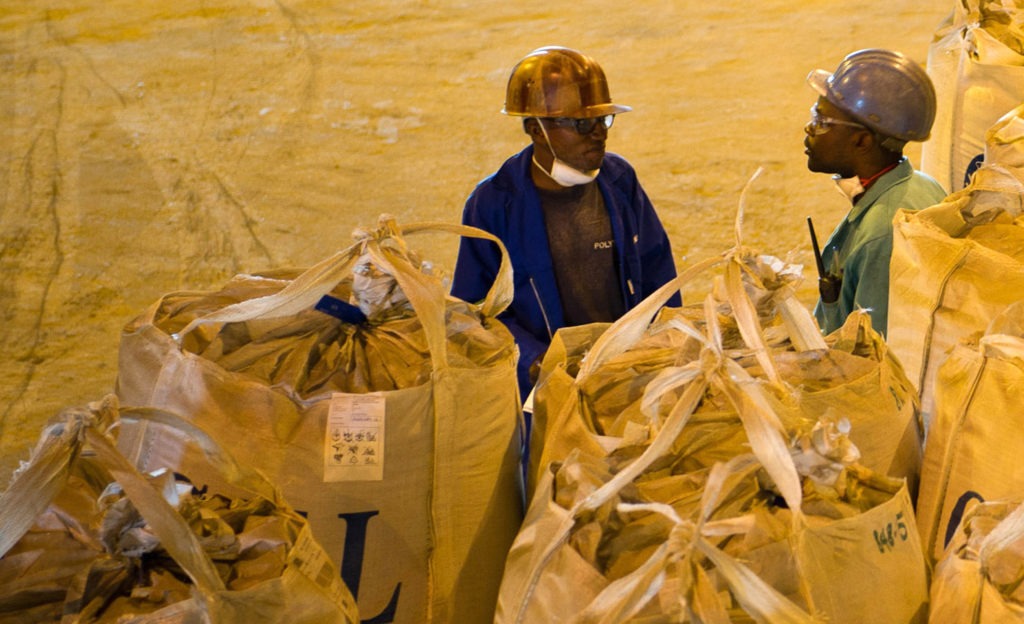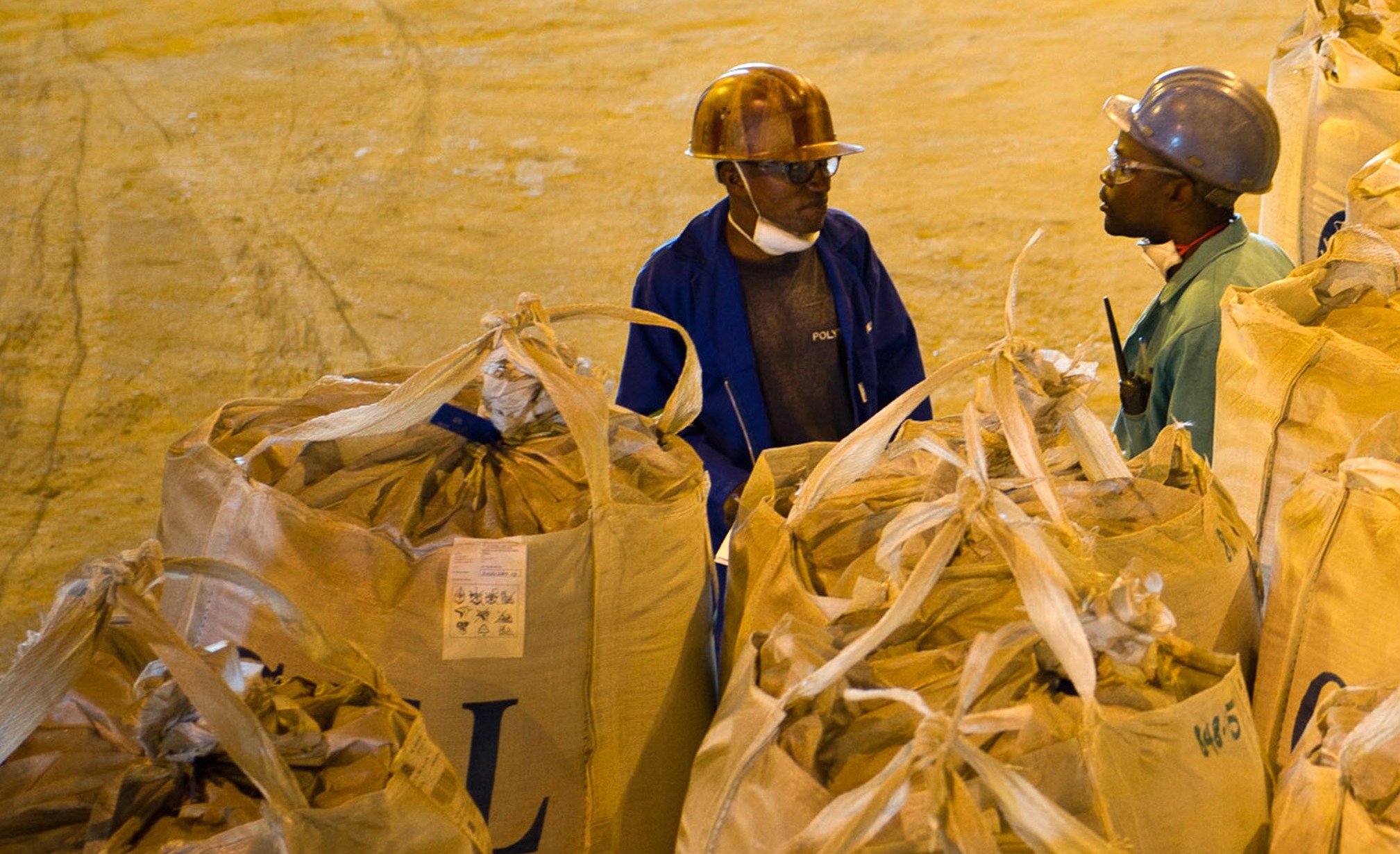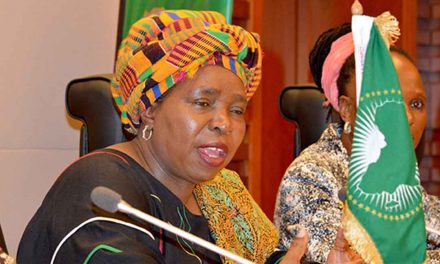
Congolese workers with bags of copper and cobalt, Lubumbashi, DRC © Phil Moore / AFP
Resource-rich countries are losing billions in revenue through bad and inefficient tax regimes and underselling mining assets
The Africa Progress Panel puts it well: if Africa is so resource-rich, why are its people not better educated, its children well nourished and its adults living longer? This decades-old question remains as relevant today as it ever was. Africa’s subsoil is enormously rich and will remain so, at least for some years to come. It hosts an estimated 30% of the world’s mineral reserves, and an even greater share of key precious and base metals, including diamonds and platinum.
Over 9% of the world’s petroleum reserves and 7.5% of gas reserves are found in Africa. After agriculture, the extractive sector is the most important in terms of its contribution to the continent’s GDP. The International Monetary Fund (IMF) has grouped more than 20 African countries as heavily dependent on natural resources, with resource revenues accounting for over 20% of their tax and export revenues. A much larger number of countries are more dependent than ever on natural-resources revenue, according to the 2017 Extractives Dependence Index.
Yet, to turn the continent’s abundant wealth into lasting riches for all citizens remains, so to say, a taxing challenge. So far, a few countries have fared relatively well, but most have not. The main reason is that the continent lacks a forward-looking approach aimed at fixing governance. Without it, the contribution of the resources sector to broad-based and inclusive growth across the continent will continue to be less than desired.
The extractive sector stands out for its enormous rents – surplus income which governments could potentially tax without any impact on investment decisions. But most African governments continue to tax the sector badly and spend the revenues poorly. The net result sticks like a “curse” with crippling consequences. Overall, Africa’s tax picture is mixed. Countries have made progress in mobilising greater domestic revenues, including taxes, to fund their priorities. Tax revenues have trended upwards in absolute terms, both in resource-rich and resource-poor countries, peaking at $561 billion in 2013, before dropping to $400 billion in 2015, following the prolonged slump in commodity prices.
As a share of GDP, Africa collects about 23% of its revenues from taxes, up from 17.5% in 1980, according to a 2014 article by Mahmoud Mansour. However, this contrasts with Organisation for Economic Cooperation and Development (OECD) countries, which generate over a third of their revenues from taxes. Yet these averages hide differences. According to a 2017 Africa Economic Outlook (AEO) report by the African Development Bank on entrepreneurship and industrialisation, the commodity boom led to a 50% peak in tax revenues from natural resources as a share of overall revenue in 2012, before collapsing.
In fact, resource revenues halved, both in absolute and proportional terms, tumbling from 14% of GDP in 2012 to 7% in 2015. Analysis of an AEO 2017 dataset shows that resource revenue, where this comprises the major source of government income, fell to crisis levels, significantly halving government budgets across key resource-dependent economies in Africa. Algeria’s budget decline for this reason was 50%, while Angola’s was 52%, Chad’s 65% and Nigeria’s 35%.
A weak tax effort means less money and more uncertainty. The tax base in African resource-rich countries remains narrow. A 2010 study by economist Leonce Ndikumana et al has shown that while tax revenues from natural resources move up and down with commodity cycles, revenues collected from other sectors as a proportion of GDP remained flat over the decade from 2000 to 2010, averaging 6%.
This contrasts with non-resource rich economies, where domestic revenues over the period 2010-2015 increased by 9.6%, a result of broadening the tax base to capture a greater share of non-resource revenues. The star performers include Ethiopia (60%) and Rwanda (44%). Consulting firm McKinsey estimates that by stepping up their tax efforts, governments in Africa could collect between $175 billion and $355 billion in additional domestic resources. Mineral-rich African countries failed to take advantage of the most recent commodities boom. In addition, resource-endowed countries are not collecting a fair share of tax revenues from natural resources. A broken tax system – rules and practices that are ill-adapted to mobilise adequate revenues along the entire value chain – bleeds a country of revenues.
Mining companies continue to shift their profits from resource-rich countries where economic activity occurs to shell establishments in low-tax jurisdictions, which have been set up for the express purpose of allowing operators to pay minimal tax, or none at all. Multinational companies are alleged to employ aggressive tax-planning strategies, including complex borderline tax dodging practices and, in some cases, outright tax evasion – all of these eroding the tax base.
In Africa, what theory predicts has rarely happened in practice, so far. The German Development Institute reckons that, together, resource-rich African countries could have obtained an additional $70 billion in revenue from the extractive sector if their effective tax rate for the sector was the same as that of Australia, a comparable resource-rich country.
In fact, Australia collected 17% of the overall sales of mineral products in actual tax over the period 2003-2008, while Zambia collected less than 2% and Ghana less than 5%. The High-Level Panel on Illicit Outflows from Africa, led by Thabo Mbeki, estimates that over $50 billion in the form of illicit financial outflows – including transfer mispricing and misinvoicing – leaves the continent every year. (However, the report has been criticised for its methodology, as well as for focusing the blame for such practices almost entirely on mining companies.)
Corruption also accelerates the bleeding. Accounting consultancy firm PricewaterhouseCoopers (PwC) reckons that Nigeria’s resource-rich economy would be some 22% bigger if its levels of corruption were cut to levels similar to those in neighbouring Ghana.
Gaps in capacity along the entire value chain also contribute to drive a deep wedge between what is actually collected and what could potentially be raised. Most often, African countries are unable to properly assess and value their resources. For example, a 2013 African Progress Panel report on equity in the extractive industries estimates lost revenue from the under-sale of mining assets in the Democratic Republic of Congo (DRC) at about $1.36 billion, when independent assessments of their value are used. This amounts to double the government’s budget for education and health.
Africa invests very little to map the quantity, quality and value of its subsoil assets – below $5 per km2 against over $65 per km2 in comparable mining regions such as Australia and Canada.
Finding a balanced approach to designing and implementing tax instruments for African contexts remains a challenge. Capacity demanding, but efficient profit-based fiscal instruments are underused, including corporate income tax and the profit-based royalty system. Corporate income contributions to economies in mineral-rich Africa through taxes have remained flat even when commodity prices have risen.
The average corporate income tax rate in Africa, which applies to the mining sector, is about 32% – higher than the world average. But governments have often decreased the rate at which profits are taxed and granted mining companies excessive, revenue-sacrificing tax exemptions.
Aside from this, managing revenue is another pressing fiscal challenge facing many African countries. Revenues from natural resources offer one of the best opportunities to improve development outcomes in many countries. The African Development Bank estimates that revenue from newly discovered resources could contribute up to 31% of additional government revenue in certain very poor countries – and this, during the first 10 years of exploration. In Mozambique, projected new revenue streams from natural resources could fund at least half of the country’s financing in health in the next decade, says a 2015 AfDB report on leveraging natural resources for human development in Africa. How well the revenues are spent is also critical.
While progress has been made, there is still much room to improve revenue management in Africa. According to the Ibrahim Index of African Governance, the quality of the continent’s fiscal institutions declined between 2011 and 2014.
Overall, revenue management in resource-rich African countries is poor, with a median score of 40 on the Natural Resource Governance Index. The median corruption perception index is slightly lower in resource-rich than in resource-poor countries, suggesting higher levels of corruption and mismanagement of public funds where there is a relative scarcity of natural resources, according to the author’s calculations based on data from an African Economic Report database.
Priorities for spending revenue and outcomes are often misaligned. Public expenditure on education (4.5%) as a share of GDP in resource-rich countries remains relatively lower than the African average (4.8%). Most resource-rich countries rank low on the UN’s Human Development Index, with relatively low educational and health outcomes. Less than 20% of the revenue from Africa’s resources is spent on basic human assets such as health and education.
Striking the right balance between spending and saving is another central challenge to improving the quality of Africa’s fiscal governance. Many of the continent’s resource-rich countries have created sovereign wealth funds (SWFs), while others are finalising their own funds. But these funds are modelled on the Norwegian sovereign wealth fund, which explicitly aims to save for future generations. Meanwhile, many African countries need huge amounts of investment, so this approach does not seem the most appropriate.
New research shows that a SWF would contribute better to converting natural-resource wealth into meaningful changes in peoples’ lives; directing revenues towards productive domestic investment by focusing on stabilisation – buffering government spending by drawing on saved resource revenues abroad when commodity prices fall – and “parking”– temporarily saving the funds abroad until the economy is able to absorb them. For example, Africa’s infrastructure gap – that is, the difference between the amount invested in infrastructure and the amount that should be invested in it – is estimated at $93 billion a year.
Meanwhile, Africa’s SWFs amount to $112 billion. Given the difficulties in sourcing finance, including the cost of borrowing, SWFs might be a viable means of financing profitable, high-impact transformative projects in Africa.
Transparent management of the continent’s natural resources is another challenge. SWFs might offer an opportunity to channel temporary incomes from the sale of finite/non-renewable resources into permanent income streams through investment on productive assets. However, on their own, they remain no substitute for governance. The management of African SWFs is very weak, with a median score of 24/100 on the recent Natural Resource Governance Index.
African governments will need to find critical gaps in their own capacity, and design and implement real-world tax systems that are fit for purpose. They will need to balance the competing interests of all stakeholders, including those of citizens and mining companies, against their long-term development goals to transform the structures of their economies.
Fortunately, there are already workable strategies, tools and practices. For example, the Africa Mining Vision has endorsed a continental framework for the broad-based and inclusive development of the mineral sector. There are also other opportunities to build capacity. These include the UN-sponsored Sustainable Development Goals, the international tax agenda and the impending implementation of the Organization for Economic Cooperation and Development and Group of 20 (OECD/G20) Base Erosion and Profit Shifting (BEPS) action plan.
BEPS is a set of globally endorsed standards aimed at strengthening international tax governance and equipping tax authorities with better tools to effectively address cross-border tax avoidance. While the newly adopted rules do not coherently tackle fundamental flaws in the international tax system, they remain the most significant reforms since 1920, when the patchwork of current international tax laws was first put together – a first step on a much longer road. BEPS is non-binding on African countries, but it will necessitate major capacity-demanding reforms in countries’ tax rules to curb revenue-eroding loopholes that have international dimensions.
African countries, therefore, will have to up their game. They will need to inform themselves about the international tax-transparency agenda and explore emerging opportunities to further shape international tax rules. It will make sense to prioritise their limited capacities in areas with the most implications for their ability to mobilise greater revenues, as well as to leverage the extractive sector as part of the transformation of their economies. It would be wise, therefore, for African countries to link their efforts in a forward- looking manner in this regard, including sharing information and experiences in revenue mobilisation at the continental level.
Perhaps counter intuitively, the current down cycle in commodity markets actually provides Africa with an opportunity. The continent, and all stakeholders in natural-resource management and exploitation, should use the lull to reform and build credible institutions. What is needed now is to walk the talk. It is only in this way that the continent can be cleansed of the “curse of riches”.
CHARLES AKONG is a mineral economist and founder of the Mettaboy Report, a policy analysis blog. He has worked with many global and regional organisations, including the African Minerals Development Center (AMDC) and the African Union Commission based in Addis Ababa, Ethiopia. He holds graduate degrees from Columbia University in New York, Hertie School of Governance, Berlin and the London School of Economics.













